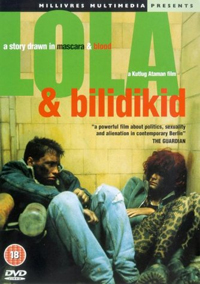 Lola
and Bilidikid
Lola
and BilidikidCerisaye's Review:

 Lola
and Bilidikid
Lola
and Bilidikid
Cerisaye's Review:
A very effective and naturalistic film (German/Turkish with subtitles) about gay men living in Berlin, Turkish guest workers and their families, and, in counterpoint, a German aristocrat whose life is far removed from theirs, yet connected by shared sexuality.†
†Itís a bit hard to follow at first, with a complex storyline.† Once I got straight names and relationships, I got a lot out of watching the film.
Bili is a macho man in white T-shirt and black leather who doesnít want his friends to know his secret.† He wants Lola to have Ďthe opí so they can be married and live together without shame.† He thinks life isnít worth living if youíre gay.† Lola disagrees.† She accepts who she is, and believes two men can love without one having to be a woman, but sheís scared of losing Bili, so she goes to Osman, the brother who threw her out of the family home years before to ask for money.† Younger brother, Murat, didnít know about Lola.† Osman wants to make him a man, but Murat has his own idea what that means.† Thereís a powerful scene in which heís shyly getting intimate with a schoolmate, only to be interrupted by the boyís thuggish friends, who then joins in as they bash Murat.† Muratís mother bathes his wounds and he learns how he was born to replace Lola.† Fiercely protective, she colourfully curses those who beat her son, ďMay Allah render their semen putrid.Ē†
Bili is a no-good, selfish pimp, who tells† Murat† ďNever be a hole.† Bili and Osman are two of a kind warns a transvestite friend of Lolaís. Both traditionalists limited by cultural notions of masculinity, they mistreat Lola and Murat and deny their own sexual identity.†† The driving force behind the film is German-born Muratís dramatic journey of self-discovery, in defiance of his brother, and this personal story is used to highlight issues of homophobia, racism, violence, immigration and cultural diversity.†
Thereís an intriguing and often comic strand about a rich German architect with an over-protective mother and roguish hustler boyfriend, Iskender, that doesnít exactly play out as you expect.
The story builds to an edge-of-the-seat climax.† We see Murat and his school friend alone again together, and Muratís mother defiantly leaving the house and throwing off her headscarf.
Realistic and compelling, itís a film that asks the viewer to think, and doesnít compromise.† The actors work well in their roles.† There are disturbing scenes, thatíll move you to tears, yet thereís humour and charm, so it raises laughs too.† I guarantee it will stay with you.†
Ladymol's Review:
An unusual, but strangely compelling film about gay life in the Turkish population of Berlin. Hated for being Turkish to start with, Murat hasnít got much going for him. But heís gay, too, and life doesnít seem able to get much worse.† Then his long lost brother, now call Lola, makes contact with him.
Lolaís boyfriend, Bili, loves Lola, but doesnít want to be gay, and tries to persuade Lola to have the operation so they can be married like ďrealĒ people.
Poverty, racial and homophobic bigotry surround them at every turn.
One of Muratís friends is a young neo-nazi, but heís also gay and equally confused about his sexual identity. In one of the most affecting scenes in the film, they share an experimental kiss, which goes horribly wrong.
This is a gritty film. Itís in German and Turkish with English sub-titles. Itís very European. But it is thought provoking and has some excellent performances.Not light viewing, but well worth seeing.
Buy from Amazon UK HERE